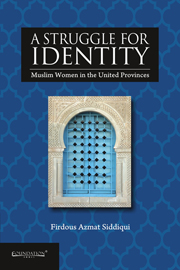Book contents
- Frontmatter
- Contents
- Acknowledgements
- Introduction
- 1 Social Stratification of Muslim Women in the United Provinces
- 2 Socio-religious Movement and the Muslim Women's Issue
- 3 British Perception of Muslim Women: Questions of Fecundity and Health
- 4 Crises in the Social and Economic Identity of Muslim Women: The Great Uprising of 1857
- 5 Changing Profile of Muslim Women through Education
- 6 Patriarchy and Social Obligation of Indian Muslim Women
- 7 Cultural Clash: From Tawaif to Kasbi
- 8 Law, Land and Muslim Women: The Economic Situation
- 9 Muslim Women's Response to the New Judicial System
- Conclusion
- Glossary
- Bibliography
- Index
8 - Law, Land and Muslim Women: The Economic Situation
Published online by Cambridge University Press: 05 October 2014
- Frontmatter
- Contents
- Acknowledgements
- Introduction
- 1 Social Stratification of Muslim Women in the United Provinces
- 2 Socio-religious Movement and the Muslim Women's Issue
- 3 British Perception of Muslim Women: Questions of Fecundity and Health
- 4 Crises in the Social and Economic Identity of Muslim Women: The Great Uprising of 1857
- 5 Changing Profile of Muslim Women through Education
- 6 Patriarchy and Social Obligation of Indian Muslim Women
- 7 Cultural Clash: From Tawaif to Kasbi
- 8 Law, Land and Muslim Women: The Economic Situation
- 9 Muslim Women's Response to the New Judicial System
- Conclusion
- Glossary
- Bibliography
- Index
Summary
Traditionally, the position accorded to women is gauged either by that of their husbands or the status of their families; they do not possess a separate identity of their own. Few women from the upper classes were economically independent; most women were reliant on their husbands or other male members of their family. In fact, almost all religious scriptures affirm women's economic dependence on men. The second largest chapter of the Quran states:
Men are the protectors and maintainers of women, because Allah has given the more (strength) than the other, and because they support them from their means. Therefore the righteous women are devoutly obedient, and guard in (the husband's) absence what Allah would have them guard.
From time immemorial, women belonging to lower social orders had contributed to their means of subsistence, and therefore appeared free from unnecessary restraint. Since for centuries the Indian economy has been based on agriculture, a large portion of its population was directly or indirectly dependant on land. Among the female population, about 59.3 per cent of women belonged to the agriculture class; however, only 4.8 per cent owned their land.
This chapter explores the economic condition of Indian Muslim women and the extent to which they enjoyed property rights. To properly understand their economic condition, it looks at Indian Muslim women of two classes, viz., the landed class and the occupational class. Since one-fifth of the land in the United Provinces belonged to Muslims, it is essential to investigate the colonial land system before investigating the condition of peasant women.
- Type
- Chapter
- Information
- A Struggle for IdentityMuslim Women in United Provinces, pp. 180 - 196Publisher: Foundation BooksPrint publication year: 2014



